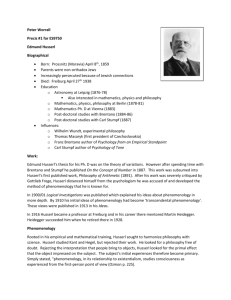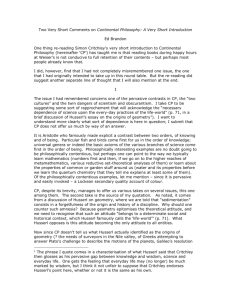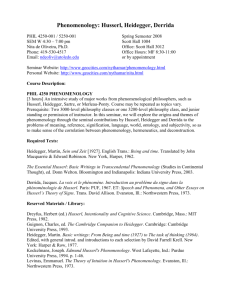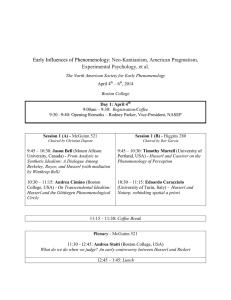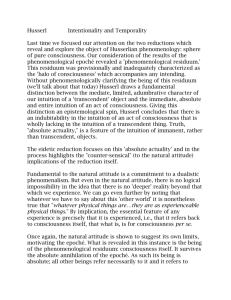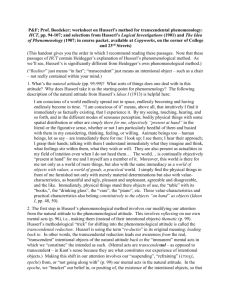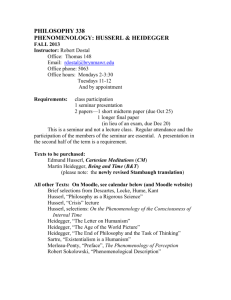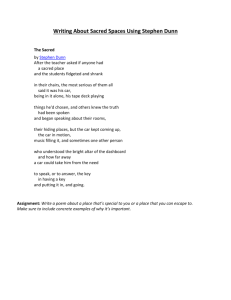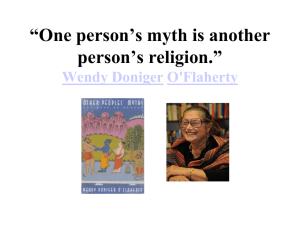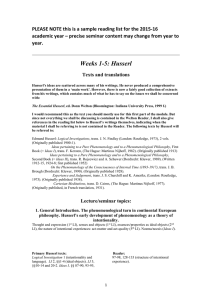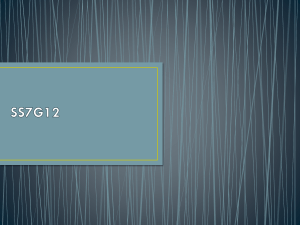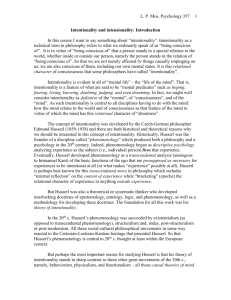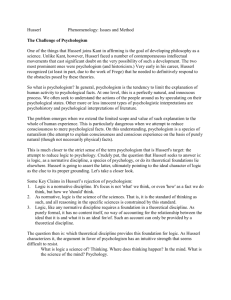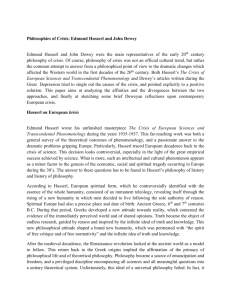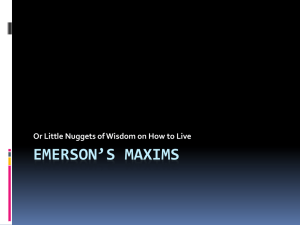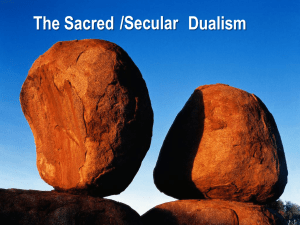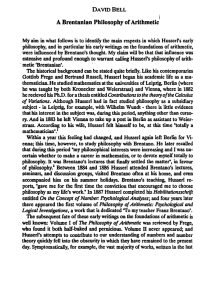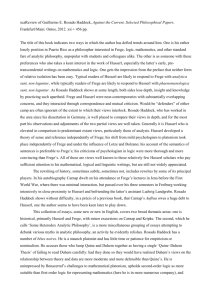Phenomenology
advertisement
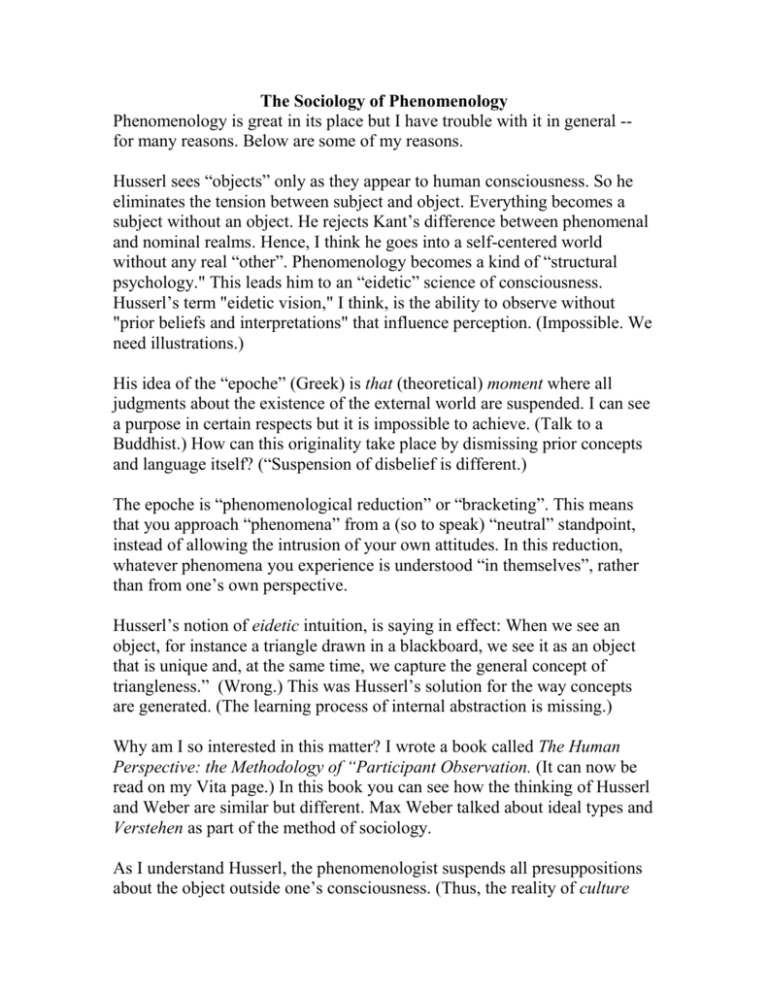
The Sociology of Phenomenology Phenomenology is great in its place but I have trouble with it in general -for many reasons. Below are some of my reasons. Husserl sees “objects” only as they appear to human consciousness. So he eliminates the tension between subject and object. Everything becomes a subject without an object. He rejects Kant’s difference between phenomenal and nominal realms. Hence, I think he goes into a self-centered world without any real “other”. Phenomenology becomes a kind of “structural psychology." This leads him to an “eidetic” science of consciousness. Husserl’s term "eidetic vision," I think, is the ability to observe without "prior beliefs and interpretations" that influence perception. (Impossible. We need illustrations.) His idea of the “epoche” (Greek) is that (theoretical) moment where all judgments about the existence of the external world are suspended. I can see a purpose in certain respects but it is impossible to achieve. (Talk to a Buddhist.) How can this originality take place by dismissing prior concepts and language itself? (“Suspension of disbelief is different.) The epoche is “phenomenological reduction” or “bracketing”. This means that you approach “phenomena” from a (so to speak) “neutral” standpoint, instead of allowing the intrusion of your own attitudes. In this reduction, whatever phenomena you experience is understood “in themselves”, rather than from one’s own perspective. Husserl’s notion of eidetic intuition, is saying in effect: When we see an object, for instance a triangle drawn in a blackboard, we see it as an object that is unique and, at the same time, we capture the general concept of triangleness.” (Wrong.) This was Husserl’s solution for the way concepts are generated. (The learning process of internal abstraction is missing.) Why am I so interested in this matter? I wrote a book called The Human Perspective: the Methodology of “Participant Observation. (It can now be read on my Vita page.) In this book you can see how the thinking of Husserl and Weber are similar but different. Max Weber talked about ideal types and Verstehen as part of the method of sociology. As I understand Husserl, the phenomenologist suspends all presuppositions about the object outside one’s consciousness. (Thus, the reality of culture and society disappear.) Husserl argues that a work of art exists only in the mind of the perceiver. A literary work becomes considered “in itself”; apart from any relationship it might have to the life (or the intention) of the author. This outlook has its value, but for me it does not recognize the social or cultural conditions at the time in which the work was produced, or even how it affects on the reader. Phenomenology “brackets” the question of the actual existence of the objects under “intention”. To assert that “thought” is “intentional” is to say it is of the nature of thought to be directed toward objects. In other words, phenomenology focuses on issues about which “we” can attain certainty. Certainty is in the immediate “givenness” of intuition residing in pure subjectivity. As I remember the history of phenomenology (long ago), it started with Hegel, and went next to Husserl and then to Heidegger and onward. Hegel wanted to explore “what comes to us in conscious experience” to get to the Absolute logic behind all phenomena. Husserl, in turn, wanted to get to the “essence of consciousness” from a first-person viewpoint. That was his solution of the problem of how concepts are generated. (Not true.) Husserl described his position as "descriptive psychology" What? Sociology is missing and this makes a difference in what happened later. I remember Sartre’s opposition to Husserl with his notion of “existentialism” (versus Husserl’s essence) but Sartre did not solve the problem of knowledge any better as it actually arises in the mind and in society as well. So what’s my problem? My problem with this philosophy is that it misinterprets reality. It can have grave consequences in the political sphere. Hegel made the state into a totality. (My words.) The State, he said, is “mind objectified”, the embodiment of all reason. It carried the ultimate values of humankind. From this position Hegel moved on to formulate the Absolute (logical, ontological and metaphysical) Spirit (Geist) behind all phenomena. What’s another problem? He could not see the “evolution” of society. Why” Husserl did not see society evolving outside the mind. (Hegel saw civil society as an “intermediate” place between the state and the family but ethically requiring the unity of a state). Sociologically speaking, society was differentiating into separate sectors, like government, business, religion, art, science, with an untold number of NGOs. Without seeing the evolution of society, Hegel’s philosophy became the precedent for totalitarianism. Heidegger became a Nazi. He thought that knowledge could be understood through the structure of the mind. He did not think outside his mind, objectively. He saw the individual mind as having a universal character. He could not see the evolving society. This outlook of Hegel and Heidegger influenced others, like Sartre, Karl Jaspers, Maurice Merleau-Ponty, Alfred Schutz and Mircea Eliade. I do not know the details but Eliade was a top authority on what is sacred. Then…. Mircea Eliade became a fascist. He gave his support for the Iron Guard, which was fascist and anti-Semitic. I was fascinated with Eliade’s work on the “sacred”. I wanted to explore the meaning of what is “sacred” on our campus. In the late sixties I asked Fr. Robert Daly (Chair of Theology) to hold a conference on the subject of the “sacred.” He organized a panel at St. Mary’s Hall. A young historian, teaching at BC, said, “Everything I teach is sacred.” I argued, “No, You are teaching secular history.” And a BC philosopher was on the panel, praising Hegel and Heidegger. Mircea Eliade and these other philosophers were writing from a psychological perspective. Husserl was looking for an essence but Sartre’s “opposing outlook” also had a psychological outlook, voiding any sociological perspective. Eliade prioritized the sacred over the secular. He did not see the evolution of the secular from the sacred in the history of society. (It goes back to ancient times.) He could not see how these two concepts today (sacred/secular) stand in tension with one another. A month ago I gave a talk to the retired faculty on Evolution from the Big Bang. Among other things, I said that evolution was about “transcendence and meaning.” Two of our seminar members (Dennis and Andy) were there. They may have an inkling of the problem I see here in terms of the “great polarities“ like Subject/Object, Sacred/Secular, Individual/Community, Mind/Matter, and Inside/Outside. I argued at that meeting of retirees: “You cannot choose one side over the other.”
